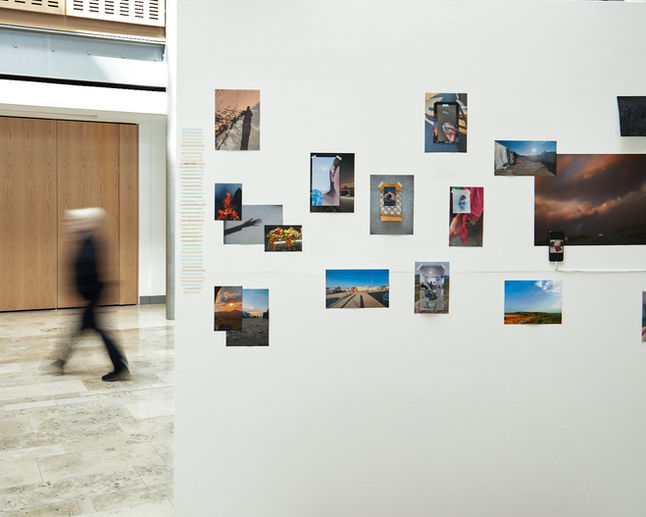Curating Activism, Curated by Dr.Clare Gallagher. Frederic Douglas Festival 2024
Art and activism are interwoven in Northern Ireland in myriad ways: life here has given us a lot to challenge, through conflict, reproductive injustice, hate crime and social inequalities. The mainstream media and cultural representations have often failed to adequately reflect these issues, instead focusing on simplistic depictions and homogenous voices.
The artists here are part of a significant movement which brings together creative forces and social concerns to communicate with sensitivity, humour, eloquence and freshness. They present a grassroots alternative to our often-broken political system as a means to press for meaningful, longlasting change.
Some of these artists are part of the Turner Prize-winning Array Collective whose sibín documented performative protests in support of legalising abortion and gay marriage and brought these local issues to a wider audience. Others take a stand against persistent gender inequalities or the disturbing rise in queer hate crime.
Art in the North of Ireland, though growing out of a tiny place, has long found empathy and connection with global issues. Some of the work here carefully addresses overlooked and marginalised communities from outside our traditional domestic binaries, such as survivors of the Yezidi genocide, the missing Black bodies in the archives of war, and the experiences of refugees arriving to a context of hostile state rhetoric.
All these artists propose collective action as a shared response to inequality and injustice. They insist on the validity and visibility of marginalised subjects and voices, and use art to inspire change through warmth, persistence and solidarity.
Artists: Dr Emma Campbell, Dr Laura O’Connor, Dr Alessia Cargnelli, Sarah Tehan, Aidan O’Neill, Dr Jolene Mairs Dyer, Belfast Feminist Film School, A Culture of Hope, Belfast Won't Always be Like This, Donal Talbot
In collaboration with the Free Yezidi Foundation and survivors of the 2014 Yezidi Genocide, this work in progress aims to highlight the current situation of survivors/victims almost a decade later. To this day, 2600+ people remain missing, assumed murdered or still in ISIS captivity, with over 180,000 people still displaced, living for ten years in ‘short term/temporary’ accommodation across 15 camps for internally displaced people in the Kurdistan Region of Iraq.
Aware of the power of photography, a new tool of communication during his lifetime, 168 portraits of Fredrick Douglas were created, making him the most photographed man in America in the 19th Century. To mirror his recognition and engagement with the visual medium, this installation version displays 168 images by survivors collected and created on mobile phones and during collaborative sessions in the Duhok region of Northern Iraq.
The importance of embracing new media and new ways of using it opens discussions around old methodologies and those who utilise them. This installation explores the problematic practice of outsider photographers, points towards new ways of working and highlights the importance and relative ease afforded to collaboration through tools such as the mobile phone.
Artists: Zahra Alias, Mayasa Bro, Alia Qassim Dawoud, Flus Abrahim Faris , Hizrat Gali, Zina Haji, Suzan Haji Hasan, Wansa Ibrahim, Sulav Khdir Jaafar , Maria Kamo, Hadya Khudeda , Ghulizer Khalo Lazgen, Nadu Qasim Murad, Zeren Barjas Nisro , Zina Barjas Nisro, Aidan O’Neill, Zainab Salam, Khalida Ali Salo, Amera Shamo, Saada Shamo , Sanaa Suleiman
Join us in our mission to empower Yezidis worldwide! At the Free Yezidi Foundation, we are dedicated to providing essential support and assistance to Yezidi individuals and families affected by conflict, persecution, and displacement.
Our organization offers a range of services aimed at promoting the well-being and resilience of Yezidi communities. From providing emergency aid and humanitarian assistance to offering educational and livelihood programs and mental health and psychosocial support, we strive to address the diverse needs of those we serve.
With your support, we can continue to have a meaningful impact on the well-being of the Yezidi community, helping them rebuild their lives and regain their dignity. Whether through volunteering, fundraising, or spreading awareness, there are countless ways to get involved and contribute.
Together, we can create a brighter future for the Yezidi community and ensure they receive the support and opportunities they need to thrive. Join us today and be a part of positive change! Visit our website to learn more about our work and how you can make a difference.
















